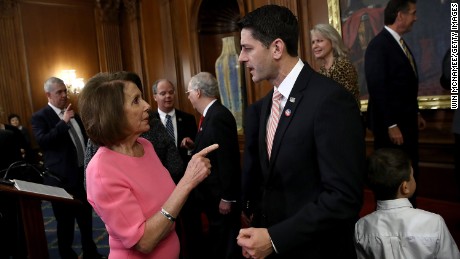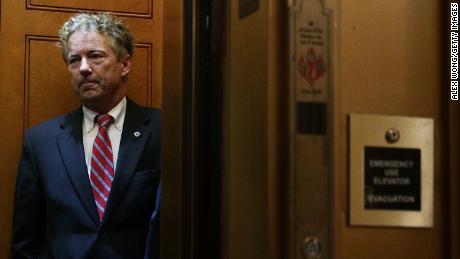Story highlights
- Phones at the White House began ringing almost immediately after Trump tweeted
- What ensued was a 101-minute long scramble to clean up the President's position
Washington (CNN)President Donald Trump's sunrise tweet casting aspersions on the domestic surveillance program his own intelligence officials have called essential set off a thunderclap of concern in Washington -- and underscored the pitfalls of the President's morning television tweet-alongs.
Phones at the White House began ringing almost immediately after Trump wrote at 7:33 a.m. ET that the FISA program up for reauthorization in the House on Thursday may have been used to "badly surveil" his campaign.
On the blinking lines: Republican lawmakers and top intelligence officials perplexed that Trump had appeared to contradict more than a week of public statements from the administration in support of the reauthorization, which allows the government to conduct warrantless spying on US soil.
Ultimately, the measure passed handily. But not until after a 101-minute long scramble to clean up the President's position ahead of the midday vote, which Republican leaders had been eying with optimism after spending weeks rounding up votes and batting down demands from the conservative and libertarian elements of their conference.
"(Chief of staff John) Kelly's phone was ringing off the hook," said one senior Republican official close to intelligence matters on Capitol Hill.
"No one could believe it," another Republican supportive of the FISA reauthorization said.
Debate over domestic surveillance
Five-and-a-half years after Edward Snowden leaked details of the government's secret spying programs, the dust-up over Trump's tweet underscored the still-roiling debate over domestic surveillance, technology and Americans' views of their own privacy.
But it also spoke to a more recent phenomenon: Trump's habit of tweeting whatever seems to come across his flat-screen televisions, no matter the advice of his aides nor the position of his administration.
When he sent his early morning message on Thursday, he quoted directly a banner graphic that had appeared on Fox News minutes earlier: "House votes on controversial FISA ACT today."
The headline was punctuated by a direct-to-camera appeal by the conservative judge Andrew Napolitano against re-upping the surveillance program.
"Mr. President, this is not the way to go," he said at 6:47 a.m. ET. "Spying is valid to find the foreign agents among us. But it's got to be based on suspicion, and not an area code."
Trump, who continues to brood over special counsel Robert Mueller's investigation into possible ties between Russia and his associates, took less than an hour to link the FISA issue to his own disputes with US law enforcement agencies.
"This is the act that may have been used, with the help of the discredited and phony Dossier, to so badly surveil and abuse the Trump Campaign by the previous administration and others?" he wrote.
Drafting a follow-up
As the tweet buzzed in notifications from Capitol Hill to the CIA headquarters in Langley, Virginia, Trump's advisers hurried to draft a follow-up that might help preserve the administration's position in support of the act's reauthorization.
CIA Director Mike Pompeo -- one of Trump's most trusted advisers who regularly administers the presidential daily briefing -- was in touch with the White House to discuss the tweet, people familiar with the situation said. A former Republican lawmaker who once declared that Trump's tweets "help" his agency, Pompeo had made a forceful case for reauthorizing the FISA program during a television interview five days ago. A CIA spokesman declined to comment.
Tom Bossert, the homeland security adviser who helps coordinate the administration's national security posture, helped triage the fallout, according to two people familiar with the matter. Eventually, a clarification tweet appeared on Trump's page that read, in part, that Thursday's vote "is about foreign surveillance of foreign bad guys on foreign land. We need it! Get smart!"
House Speaker Paul Ryan took a phone call from the President about his tweet and the surveillance issue, a source familiar with their conversation said, though they didn't discuss Trump's follow-up message about unmasking.
And Sen. Rand Paul, a forceful advocate for privacy safeguards, received a phone call from Trump after his initial tweet to discuss the matter, according to a senior aide to the Kentucky Republican.
Later, Paul appeared on MSNBC to further clarify Trump's position.
"I have spoken with the President, but I don't think it's necessary that you understand this as switching his position," Paul said on "Morning Joe."
"He still advocates -- or the administration says they advocate -- for reauthorization," he said. "So do I actually. I want reauthorization with reform. I don't think they're mutually exclusive."
White House declines to comment
The White House declined to comment on who spoke to the President on Thursday about the FISA issue.
But the tweet and its follow up continued to reverberate across Washington in the hours before the vote.
Rep. Mark Meadows, who is backing an amendment -- opposed by the White House -- to make major changes to the FISA bill, said the President's tweets have "given people pause."
And House Democratic Leader Nancy Pelosi called Ryan and urged him to pull the reauthorization bill in light of the President's tweet, a senior Democratic source said. Later, Pelosi said during remarks on the House floor that she would vote for it.
Kelly, the White House chief of staff who was inundated with phone calls earlier in the morning, traveled to Capitol Hill for the vote and spoke with lawmakers inside the GOP cloakroom just off the House floor. A retired Marine general who has insisted that Trump's tweets don't have the potential to derail the administration's agenda, he denied again on Thursday that the President's dispatches were harmful.
"It's not more difficult," Kelly said. "It's a juggling act."









